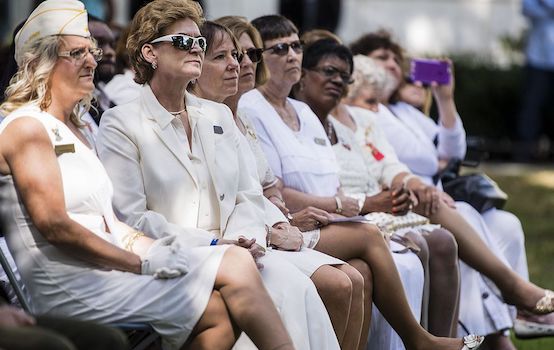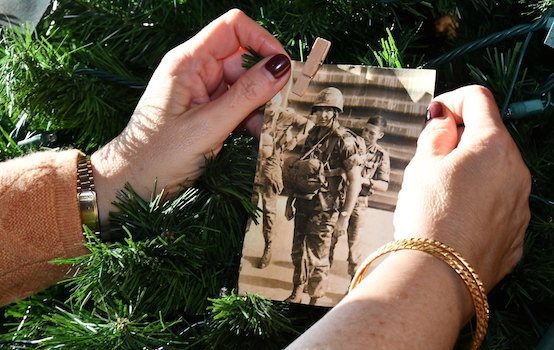The Stoic Grief of the Gold Star Mothers

In the United States, Canada, and Mexico, we recognize Miss Anna Jarvis as the founder of the now overly commercialized holiday known as Mother’s Day.
Her mother, Ann Marie Reeves Jarvis, took a neutral stand through her own Mother’s Day Work Clubs, advocating equal medical care and treatment of both Union and Confederate soldiers during the Civil War. And in 1870, abolitionist and suffragette Julia Ward Howe wrote the “Mother’s Day Proclamation,” a call to action for mothers to promote world peace. She even campaigned for a “Mother’s Peace Day” to be celebrated every June 2. In 1914, President Woodrow Wilson officially proclaimed the second Sunday of May as Mother’s Day.
But this year, it would be nice to remember the small, very special number of mothers who have suffered one of life’s most tragic occurrences—losing a child to war. They are the Gold Star Mothers, whom I had the honor of engaging with a speech earlier this year in California.
The name Gold Star Mothers derives from the custom of military families placing a service flag near their front windows. The flag features a star for each family member serving in the military—the living are denoted with a Blue Star, while Gold Stars honor those who have died in service. American Gold Star Mothers, Inc. was founded in 1929 through a federal charter from Congress.
On June 23, 1936, a joint congressional resolution designated the last Sunday in September as Gold Star Mother’s Day, which has been observed each year by a presidential proclamation.
Exemplary, altruistic nobility in the face of unfathomable loss must be viewed through the lens of the “how” and “why” our predominantly young volunteers are put in harm’s way in the first place. Since the Vietnam war (and perhaps even before), a besotted hubris has increasingly beset government leadership and the body politic alike. Our wars have been wars of choice. They have been strategic disasters. Some, like Iraq, were based on false pretenses. Yet by and large, the nation’s leadership, to put it crudely, has “no skin in the game.” And neither does the rest of the nation really. Less than 1 percent of our population serves in our name.
“In peace, children inter their parents; war violates the order of nature and causes parents to inter their children.” Thus began my remarks to the annual California Gold Star Mothers’ event in February. This year’s Gold Star Mothers’ Honor and Remembrance gathering was the fourteenth to have been hosted (and funded) by the Marines’ Memorial Association and Foundation in San Francisco, a city not renowned for its support of the armed services. (Ret.) Major General J.M. “Mike” Myatt, USMC, then CEO and president of the Marines’ Memorial Association and Foundation, initiated the effort. Through tact and a keen sense of collegiality, he quickly garnered the support and cooperation of the City of San Francisco. More importantly, he coordinated and ensured the support of not only the California Gold Star Mothers’ organization, but American Gold Star Mothers Inc. and California Blue Star Mothers—those mothers, spouses, siblings, and families that have family members serving, or who have served, in uniform.
In the United States, we skirt the matter of grief, and even more so of death. Gold Star Mothers and afflicted family members endure one of the most tragic events imaginable. They all are in a dark, raw place. The meaningless flutter of platitudes, the misplaced focus on awkward condolences—these gestures, well meaning in principle, show scant recognition that the bereaved are in an unknown and terrible twilight from which they will never entirely emerge. They are literally transformed, forever changed.
And let’s be honest: the change is life-long and not always propitious. It is true that some degree of redemption may occur, a coming to grips of sorts. That is but meager comfort, though, and hardly meaningful recompense for irreplaceable losses suffered. Shakespeare said, “To weep is to make less the depth of grief.” Absolutely no one can, nor should they ever try to, deny the departed loved ones. They are the children brought into the world and unfailingly stood by, forever cherished and forever adored. They were viciously ripped from life in war. The survivors are driven to their knees by the overwhelming conviction that they have nowhere to go. The heart of grief’s most difficult challenge isn’t “letting go” of those who have died but making the transition from loving in the present to loving in separation.

I am no stranger to the loss of loved ones to abject violence. Nor will I ever be unburdened of grief. Grief is universal. And yet grief is also intimately personal. How one grieves is who one is. We grieve individually, uniquely, within our own private solitude. This does not assuage the pain, the reality of ultimate loss, but it does give due to the fact we are human.
The grave poignancy of the grief shared puts on vivid display the increasingly rare type of individual that loved ones embody—yes, the present tense is intentional. For they have done so much—paying the ultimate price through their sacrifice—to uphold the universal legitimacy of humanism. These people aren’t supposed to exist anymore except in our remembrances of the so-called Greatest Generation. Gold Star Mothers expose that as a lie.
Though Gold Star Mothers walk together down an unpredictable, painful, draining, and exhausting path, they seek hope. The work they do is largely unheralded, little known, and poorly, if at all, understood. This can be, certainly in part, attributed to the reality that a minuscule number of our citizens ever actually serve in uniform. And shouldn’t this Mother’s Day be a time for our country’s citizens to pledge individual responsibility in the form of national service? And resolve ourselves to hold national leaders to account?
The work of the Gold Star Mothers is never-ending. If a soldier, sailor, Marine, or airman dies while serving on active duty, regardless of the cause, Gold Star Mothers are there. Their faith, devotion, and selflessness unequivocally embody nobility unabashed.
Colonel John McKay, a U.S. Naval Academy graduate, is a twice combat-wounded veteran. An Olmsted Scholar (Spain), he holds master degrees from Georgetown University and the National War College. He is currently an adjunct professor at California State University, Sacramento.
Comments